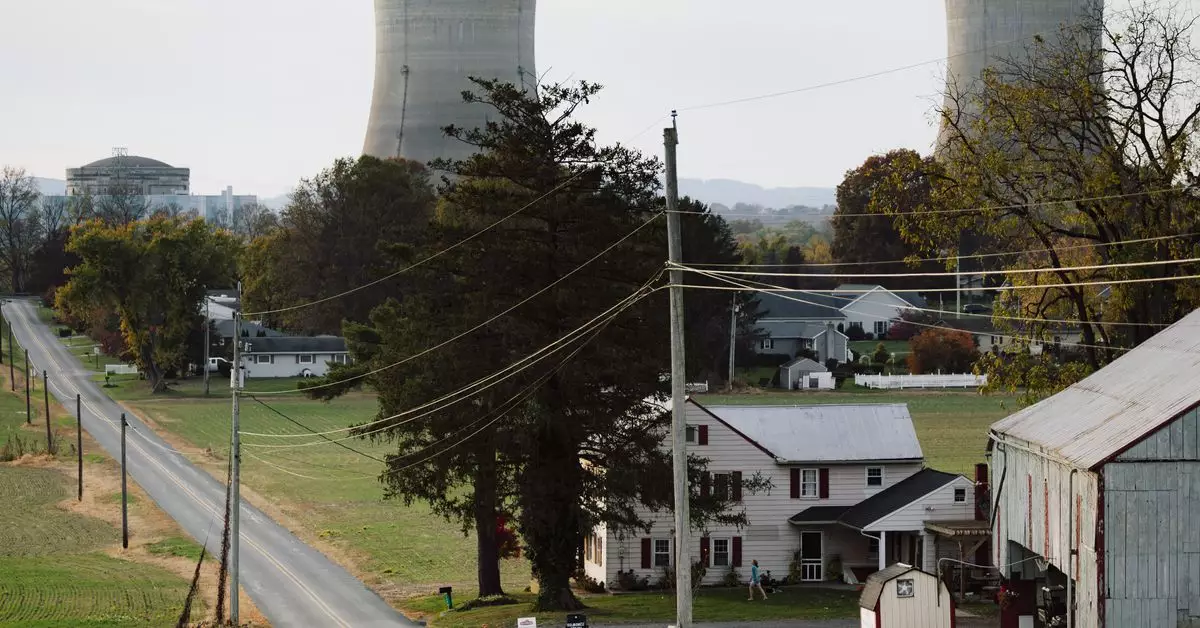The landscape of energy consumption and sourcing is undergoing a radical transformation, with nuclear energy emerging as a linchpin in this evolution. The recent announcement by the General Services Administration (GSA) regarding a groundbreaking nuclear energy contract marks a significant shift in the federal government’s approach to energy procurement. This 10-year, $840 million agreement amounts to a staggering commitment of 10 million megawatt-hours of electricity, enough to power over 1 million homes each year. Awarded to Constellation, the nation’s largest operator of nuclear power facilities, this contract not only underlines the importance of nuclear energy but also highlights its growing role in the broader energy market.
The escalating demand for energy, especially from burgeoning sectors like artificial intelligence (AI) and data center operations, has compelled major tech companies such as Microsoft, Google, and Amazon to form strategic alliances with nuclear power providers. Indeed, Microsoft’s recent partnership with Constellation to restart the historic, but long-dormant, reactor at Three Mile Island epitomizes this trend. This facility carries the weight of historical significance, being the site of the most infamous nuclear accident in U.S. history, yet it is indicative of a renewed faith in nuclear power’s potential as a stable and clean energy source. According to Constellation’s CEO, Joe Dominguez, these developments signal a noteworthy shift in how both corporate and governmental entities are perceiving nuclear energy, carving a path toward sustainable investment in this crucial sector.
The implications of the GSA’s contract stretch beyond immediate energy needs; they tap into broader political and economic principles. The U.S. government’s status as the largest energy consumer in the nation affords it a powerful platform to influence market dynamics and propel the domestic nuclear industry forward. With this contract, the Biden administration is further signaling its commitment to transitioning away from fossil fuels and towards more sustainable energy sources, placing nuclear energy at the forefront of this strategic pivot. According to experts, this move could manifest as a stabilizing force in the face of escalating competition for clean energy resources, particularly as the nation grapples with unprecedented demand from energy-intensive operations.
Constellation has positioned itself as a champion of carbon-neutral objectives, claiming to generate roughly 10 percent of the nation’s carbon-free energy, primarily through its nuclear operations. The firm aims for 100 percent carbon-free electricity by 2040, a target that underscores the broader urgency surrounding climate change. This contract allows Constellation to enhance its existing nuclear infrastructure and pursue additional technological advances, thereby increasing its capacity by an additional 135 megawatts. The arrangement with the GSA serves to stabilize pricing for federal agencies, protecting them from fluctuating market conditions and ensuring a steady supply of energy from a source regarded as consistently reliable and low in emissions.
The GSA deal has been framed as an integral component of the federal strategy to maintain competitiveness in the increasingly crowded energy market. It draws a parallel with recent commitments by several high-profile tech firms to incorporate nuclear energy into their sustainability initiatives, signifying a trend that could reshape corporate energy sourcing strategies. With leading companies eagerly forging partnerships in nuclear energy, the stage is set for a ripple effect across different sectors, encouraging others to consider similar paths to ensure their energy needs are met while remaining committed to carbon-neutral goals.
As the agreement lays the groundwork for more nuclear energy procurement contracts, it can also pave the way for regulatory discussions about the role of nuclear power in a sustainable energy future. Officials from the GSA emphasized that such agreements not only lock in competitive prices but also spur investment in new nuclear capacity, effectively reversing the perceptual tide that long sidelined nuclear power in the discussions around renewable energy sources.
The recent GSA contract stands as a watershed moment in the narrative of America’s energy future. It encapsulates the synergy between federal support and private enterprise, aligning strategic goals with immediate energy needs. As the nation engages more deeply with nuclear energy, a paradigm shift in energy sourcing appears imminent, one that takes into account both environmental sustainability and economic viability. The exploration of nuclear energy can, indeed, be a crucial chapter in combating climate change while fulfilling the demands of an increasingly energy-hungry economy. The road ahead features both challenges and opportunities, but embracing nuclear energy’s potential may be the key to unlocking a sustainable, reliable, and carbon-free future.


Leave a Reply